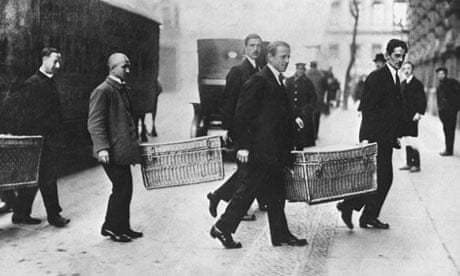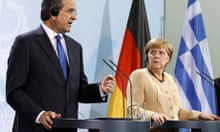Uwe Albrecht has what he calls a wonderful problem. In his office in Leipzig's fortress-like town hall, the deputy mayor says the city's population has grown so much in the past decade that he is having to build more kindergartens and schools.
"Ten years ago we were talking about closing schools," he said.
Now Leipzig is one of the success stories of reunification. New roads, rail links and a redeveloped airport have sucked in investment and international companies. But none of it would have happened without a colossal 20-year bailout that has already cost the west €1.3tn. "Without the transfers from the west, it would not have been possible."
With Europe slumped in an existential crisis, looking both desperately and fearfully to Germany to supply the leadership and the money to match its clout as the EU's central power and biggest economy, it is often forgotten that Berlin is a past master at financial bailouts. Which is why it is also weary of them.
The enormous costs the country has shouldered since 1989 have pushed many to the limits of their largesse, with people fed up with how much they have had to pay and for how long. "People feel these transfers will never stop, that the money will just keep flowing," says Matthias Kullas of the Centre for European Policy.
In a domestic debate that mirrors the rancour and resentments that have broken out across the EU as leaders bicker endlessly over who should pay to rescue the euro, richer German states now complain about constantly having to help out poorer states via the national federal subsidies system. Just as tens of thousands of Germans tried and failed last week to persuade the country's constitutional court to rule against the eurozone's bailout fund, the rich southern state of Bavaria is taking similar action to try to freeze payments to poorer areas. Some southerners are calling for Bavarian independence from Germany, arguing it would be better off. In addition to the subsidies, German taxpayers stump up a "solidarity surcharge" of 5.5% of income tax to fund the hefty costs of unification in an arrangement due to last until 2019. "East Germany might well need another trillion," said Katinka Barysch, a German economist at the Centre for European Reform.
Despite the unification fatigue, the project remains feasible for several reasons – patriotism, empathy with the less fortunate easterners, and because the process is subject to the same rules, laws, political system and culture and can be easily policed and monitored.
None of this can be said about Europe. The German merger model is not a template that can be applied on a European scale. When the euro was being created 25 years ago, the then chancellor, Helmut Kohl, used to argue that German and European unification were two sides of the same coin. The euro crisis has punctured that notion.
And in the debate now raging in Germany over Europe, it has become acceptable to assert that Kohl may have been a great chancellor, but he got one thing wrong – the euro.
"It's healthy," said Ulrike Guérot, of the European Council on Foreign Relations in Berlin. "This is the first time that Germany is having a proper polarised discussion on Europe. Europe still resonates in Germany. But now the debate is different. Some say yes, some want it smaller, some say forget it and turn their backs on it."
This polarisation is generating tremendous uncertainty and ambivalence as Berlin agonises over which way to turn, poised between giving Europe the cold shoulder or spearheading a big new integrationist push towards a much more centralised eurozone federation. For the moment it's a case of muddling through, but few believe that this can continue for long. Whatever the outcome, Europe's future – and that means Germany's future – will be decided not entirely but mostly in Berlin.
Writing last week in the Frankfurter Allgemeine Zeitung, the historian Andreas Wirsching likened Berlin's current dilemmas over Europe to those of Otto von Bismarck in the 19th century, suggesting the tug of war over the euro reflected a similar political dynamic that in the past had resulted in real wars.
Germany's position in Europe, he wrote, was "semi-hegemonic. That means a problematic in-between position which is not dominant enough to impose its will on its European neighbours, but is strong enough to be seen as a threat, generating opposition, stirring alliances, and always running the risk of leading to isolation."
That may sum up the position of the chancellor, Angela Merkel, after she was hijacked at an EU summit in June by the leaders of France, Italy and Spain over euro policy. Indeed, Merkel has acknowledged the "semi-hegemon" status, telling parliament in June that Germany may now be big and strong, but it is also overstretched and not big or strong enough to meet the expectations of rescuing the euro.
Tensions, suspicions and misunderstandings between Germany and its eurozone partners abound. Germans feel aggrieved at being penalised for success, being asked to shell out for other people's failures. The beneficiaries of the bailouts feel bullied by Berlin dictating their budget and fiscal policies. They complain when Germany leads – and when it does not. "It's always been viewed as common sense in Germany to be pro-European," said David McAllister, the prime minister of the state of Lower Saxony. "But now for the first time there's a noticeable anti-European feeling."
German competitiveness, for example, and the success of the "made in Germany" brand that has made the country a global exports champion, is frequently criticised by those on the other side of the euro debate, feeding German defensiveness and a sense of grievance.
Hans Kundnani, editorial director at the European Council on Foreign Relations, argues that Germans are blinded by an "export nationalism" or have become too dependent on their exports, which generate nearly half of all German GDP. "Germany needs to become less competitive, and contract its export sector in relation to GDP."
Such advice is met with gasps of incredulity. "We export like madmen to China, Latin America, Asia, India. We're an export machine whose success has nothing to do with Europe. We also did that when we had the deutschmark," said Wolfgang Nowak, a former aide to Merkel's predecessor, Gerhard Schröder.
Gunnar Beck, an expert on European law and a sceptic on Germany's so-called European vocation, said: "Germany has not benefited from the euro nearly as much as many say. Asking Germany to focus less on exports – the backbone of the economy – would be like asking the British economy to focus less on the financial sector. There would be an outcry."
The euro crisis has put paid to the fiction that Germany and France are equals at the top of the EU. But the German establishment has not yet resolved the issue of direction of travel. Take two voices from Germany's political elite, both of them social democratic. The signals could not be more different.
Nowak, the former Schröder aide, now directs Deutsche Bank's Alfred Herrhausen Society. He told the Guardian: "Germans have taken it on the chin for far too long, and spent far too much money on Europe. And why did we do it? Because we swooned over the idea of the United States of Europe, hoping that people would forget that we're Germans … We felt liberated at the idea of being able to be Europeans. And others let us dream the dream as long as we always paid the bill."
In stark contrast, Jörg Asmussen is playing a key role in trying to save the euro as the German on the executive of the European Central Bank in Frankfurt and a former deputy finance minister. For him the answer is the United States of Europe derided by Nowak. Asmussen said: "Every generation has to define anew how it deals with Europe and the European question. I wouldn't take it for granted that we can keep what we have achieved. Completing monetary union means four things – a banking union, a fiscal union, an economic union, a democratically legitimised political union. They belong together and depend on one another. And this integration will mean more freedom, more security, more jobs, more prosperity for the European citizen."
This is the agenda Merkel also says she is pursuing, one that will tax all her qualities of leadership if she is to perform the double trick of coaxing her own people into acceptance as well as cajoling at least 16 EU countries into buying the federal Europe blueprint.
The road to that Europe will be long and pitted with holes. Perhaps the most fundamental problem with the vision espoused by Merkel or her veteran finance minister and European architect, Wolfgang Schäuble, is that it is based not on enthusiasm or optimism, but has been born of crisis and fear. There is no upbeat dynamic, rather a dread that Europe will unravel into a patchwork of rival, resentful fiefdoms if it is not centralised.
Besides, the French and the British are comfortable with the mantle of leadership – the Germans less so.
"Germans are very, very reluctantly dealing with the idea that they are the default leaders of Europe, that we're the ones that everyone's looking to for salvation," said Constanze Stelzenmüller, of the German Marshall Fund in Berlin.
"Leadership by Germany was for decades the last thing that the world wanted and the Germans certainly would not have dreamed of doing so," added Jan Ross, a commentator for weekly newspaper Die Zeit. "The word was taboo. Whenever the words 'leader' [Führer ] and 'leadership' needed to be translated, it caused the tongue to knot."
Now that everyone is pressing Germany to show leadership, it does not know how to respond, he said.
Radoslaw Sikorski, the Polish foreign minister, famously highlighted the dilemma in a speech last year in Berlin when he declared that he feared Germany's power less than its inaction.
The acquired habit of relative passivity is proving hard to break. "I think it's very good that Germany is hesitant to have a leading role," said Margot Kässmann, former head of a Protestant churches' federation. "The history of the last century has proven that was usually the wrong path to go down."
In an internal paper distributed to German embassies this year, the foreign minister, Guido Westerwelle, dwelt on the damage being done to Germany's image abroad by its handling of the euro crisis, warning that old stereotypes about the "ugly German" were being revived among the country's neighbours.
The Der Spiegel columnist Jakob Augstein, alarmed that Berlin had blundered into self-righteous isolation over the euro, argued that it was better for Germany to be wrong but together with its EU partners than to be right on its own.
"I always felt a bit ashamed to be German," admitted Kässmann. "When I went to Yad Vashem for the first time I didn't talk German. I think I was 40 when I sang the national anthem for the first time."
When World Cup football came to Germany in 2006 it marked something of a turning point. "It was such a good feeling," recalled Kässmann. "My daughters wanted to put up flags in my house. I refused, but it showed me how they have no problem any more with their national identity and I think that's a good thing. Of course, it helped that our team came third, rather than first. To have won would have been a bit embarrassing."
If modern Germany is more at ease abjuring the power and responsibilities of leadership in favour of a quiet, comfortable life, the frictions and misunderstandings making the European crisis worse are rooted in other psychological and cultural factors. In the midst of Europe's woes, it is difficult in the towns and cities of Germany to sense any trouble. The crisis is just not happening in a country with the second lowest unemployment in Europe. This mismatch makes it difficult to mobilise public opinion behind expensive action to fix problems that people do not feel affected by.
"I get the feeling that Germans are lounging on an island and not taking on board what the rest of the world is thinking," Elmar Brok, an MEP for the Christian Democrats, said recently. "I sometimes have the impression that we Germans alone think we know what is right and that everyone else is somehow wrong."
And despite complaints in Germany that they are paying the most to bail out the Greeks, Irish and the rest, Brok points out that the country is paying the same as everyone else in per capita terms. There just happen to be more Germans.
Then there's the culture that makes Germans the biggest savers and most reluctant spenders, encouraging national stereotypes about the thrifty and the spendthrift, the scroungers and the stingy. Comparatively few Germans own credit cards, for example, and most are reluctant to take out a mortgage and are obsessed with saving.
It is customary to ascribe these habits to a history of several currency reforms over the past century as well as the wheelbarrow inflation of the Weimar Republic in the 1920s.
"Hyperinflation and currency reform are firmly anchored as major traumas in the collective German psyche," said McAllister.
"Inflation is something that frightens us, and is one of the reasons why Germany included a debt brake in its constitution." It has also insisted that others in the eurozone follow suit. Facing an election himself in January, McAllister has made the ambitious pledge to eliminate his state's debt "for the first time in our history" by 2017.
"Germans have piggy bank genes, they save like mad," said Nowak. "It's why they see Merkel as the mother of all piggy banks, defending their interests, their savings. The fear of hyperinflation is what makes the idea of printing money horrific to Germans." It also reinforces the allergy to bailouts and the growing disenchantment with the euro. Almost uniquely in Europe, Germany has no anti-EU party. But there is a growing band of eurosceptics who would like to see the country leave the euro, while the mainstream appears determined to control it.
"What won't happen is large-scale fiscal transfers without very strong central control," said Barysch.
Guerot in Berlin added: "The German political elite is very pessimistic about what is doable and still acceptable to public opinion. The Germans are eager to find a way of controlling other people's spending. If they're going to cover the others' debt, they won't do it for free."
McAllister points to the power of the press and some reports that Germans are ingesting about the rest of the eurozone. "A German reads that the average Greek retires at 58, 59, the average French person at 62. He or she feels that we've gone through all these structural reforms in the last few years, we've had little or no wage rises, we can expect to retire at 67, we've really worked hard to make Germany more competitive, yet the one who makes the effort is punished and those who don't do anything get away with it.
"Germans are distancing themselves from Europe and that's something we've never seen before."








Comments (…)
Sign in or create your Guardian account to join the discussion